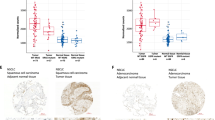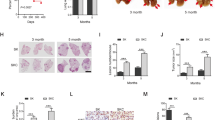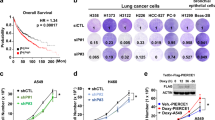Abstract
Kras-induced non-small-cell lung adenocarcinoma is the major subtype of lung cancers and is associated with poor prognosis. Using a lung cancer mouse model that expresses a cre-mediated KrasG12D mutant, we identified a critical role for the cell surface molecule CD44 in mediating cell proliferation downstream of oncogenic Kras signaling. The deletion of CD44 attenuates lung adenocarcinoma formation and prolongs the survival of these mice. Mechanistically, CD44 is required for the activation of Kras-mediated signaling through the mitogen-activated protein kinase (MAPK) pathway and thus promotes tumor cell proliferation. Together, these results reveal an unrecognized role for CD44 in oncogenic Kras-induced lung adenocarcinoma and suggest that targeting CD44 could be an effective strategy for halting Kras-dependent carcinomas.
This is a preview of subscription content, access via your institution
Access options
Subscribe to this journal
Receive 50 print issues and online access
$259.00 per year
only $5.18 per issue
Buy this article
- Purchase on Springer Link
- Instant access to full article PDF
Prices may be subject to local taxes which are calculated during checkout




Similar content being viewed by others
References
Girard L, Zochbauer-Muller S, Virmani AK, Gazdar AF, Minna JD . Genome-wide allelotyping of lung cancer identifies new regions of allelic loss, differences between small cell lung cancer and non-small cell lung cancer, and loci clustering. Cancer Res 2000; 60: 4894–4906.
Slebos RJ, Kibbelaar RE, Dalesio O, Kooistra A, Stam J, Meijer CJ et al. K-ras oncogene activation as a prognostic marker in adenocarcinoma of the lung. N Engl J Med 1990; 323: 561–565.
Ponta H, Sherman L, Herrlich PA . CD44: from adhesion molecules to signalling regulators. Nat Rev Mol Cell Biol 2003; 4: 33–45.
Al-Hajj M, Wicha MS, Benito-Hernandez A, Morrison SJ, Clarke MF . Prospective identification of tumorigenic breast cancer cells. Proc Natl Acad Sci USA 2003; 100: 3983–3988.
Dalerba P, Dylla SJ, Park IK, Liu R, Wang X, Cho RW et al. Phenotypic characterization of human colorectal cancer stem cells. Proc Natl Acad Sci USA 2007; 104: 10158–10163.
Fillmore C, Kuperwasser C . Human breast cancer stem cell markers CD44 and CD24: enriching for cells with functional properties in mice or in man? Breast Cancer Res 2007; 9: 303.
Jin L, Hope KJ, Zhai Q, Smadja-Joffe F, Dick JE . Targeting of CD44 eradicates human acute myeloid leukemic stem cells. Nat Med 2006; 12: 1167–1174.
Li C, Heidt DG, Dalerba P, Burant CF, Zhang L, Adsay V et al. Identification of pancreatic cancer stem cells. Cancer Res 2007; 67: 1030–1037.
Liu R, Wang X, Chen GY, Dalerba P, Gurney A, Hoey T et al. The prognostic role of a gene signature from tumorigenic breast-cancer cells. N Engl J Med 2007; 356: 217–226.
Prince ME, Sivanandan R, Kaczorowski A, Wolf GT, Kaplan MJ, Dalerba P et al. Identification of a subpopulation of cells with cancer stem cell properties in head and neck squamous cell carcinoma. Proc Natl Acad Sci USA. 2007; 104: 973–978.
Cheng C, Yaffe MB, Sharp PA . A positive feedback loop couples Ras activation and CD44 alternative splicing. Genes Dev 2006; 20: 1715–1720.
Jackson EL, Willis N, Mercer K, Bronson RT, Crowley D, Montoya R et al. Analysis of lung tumor initiation and progression using conditional expression of oncogenic K-ras. Genes Dev 2001; 15: 3243–3248.
Davie SA, Maglione JE, Manner CK, Young D, Cardiff RD, MacLeod CL et al. Effects of FVB/NJ and C57Bl/6J strain backgrounds on mammary tumor phenotype in inducible nitric oxide synthase deficient mice. Transgenic Res 2007; 16: 193–201.
Cheng C, Sharp PA . Regulation of CD44 alternative splicing by SRm160 and its potential role in tumor cell invasion. Mol Cell Biol 2006; 26: 362–370.
Weg-Remers S, Ponta H, Herrlich P, Konig H . Regulation of alternative pre-mRNA splicing by the ERK MAP-kinase pathway. Embo J 2001; 20: 4194–4203.
Godar S, Ince TA, Bell GW, Feldser D, Donaher JL, Bergh J et al. Growth-inhibitory and tumor-suppressive functions of p53 depend on its repression of CD44 expression. Cell 2008; 134: 62–73.
Kumar MS, Lu J, Mercer KL, Golub TR, Jacks T . Impaired microRNA processing enhances cellular transformation and tumorigenesis. Nat Genet 2007; 39: 673–677.
Johnson L, Mercer K, Greenbaum D, Bronson RT, Crowley D, Tuveson DA et al. Somatic activation of the K-ras oncogene causes early onset lung cancer in mice. Nature 2001; 410: 1111–1116.
Bourguignon LY, Zhu H, Chu A, Iida N, Zhang L, Hung MC . Interaction between the adhesion receptor, CD44, and the oncogene product, p185HER2, promotes human ovarian tumor cell activation. J Biol Chem 1997; 272: 27913–27918.
Sherman LS, Rizvi TA, Karyala S, Ratner N . CD44 enhances neuregulin signaling by Schwann cells. J Cell Biol 2000; 150: 1071–1084.
Yu WH, Woessner JF, McNeish JD, Stamenkovic I . CD44 anchors the assembly of matrilysin/MMP-7 with heparin-binding epidermal growth factor precursor and ErbB4 and regulates female reproductive organ remodeling. Genes Dev 2002; 16: 307–323.
Brown RL, Reinke LM, Damerow MS, Perez D, Chodosh LA, Yang J et al. CD44 splice isoform switching in human and mouse epithelium is essential for epithelial-mesenchymal transition and breast cancer progression. J Clin Invest 2011; 121: 1064–1074.
Penno MB, August JT, Baylin SB, Mabry M, Linnoila RI, Lee VS et al. Expression of CD44 in human lung tumors. Cancer Res 1994; 54: 1381–1387.
Hirata T, Fukuse T, Naiki H, Hitomi S, Wada H . Expression of CD44 variant exon 6 in stage I non-small cell lung carcinoma as a prognostic factor. Cancer Res 1998; 58: 1108–1110.
Acknowledgements
We thank Dr Tyler Jacks for providing the LSL-K-RasG12D mouse strain and Kim Mercer for technical assistance. We also thank members in the Cheng laboratory for discussions and suggestions.
Author information
Authors and Affiliations
Corresponding author
Ethics declarations
Competing interests
The authors declare no conflict of interest.
Additional information
Supplementary Information accompanies the paper on the Oncogene website
Supplementary information
Rights and permissions
About this article
Cite this article
Zhao, P., Damerow, M., Stern, P. et al. CD44 promotes Kras-dependent lung adenocarcinoma. Oncogene 32, 5186–5190 (2013). https://doi.org/10.1038/onc.2012.542
Received:
Revised:
Accepted:
Published:
Issue Date:
DOI: https://doi.org/10.1038/onc.2012.542



